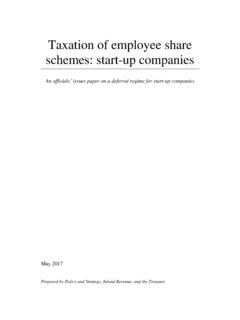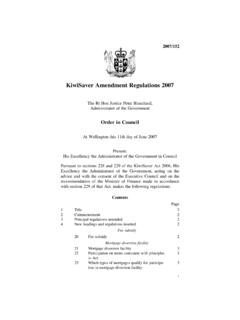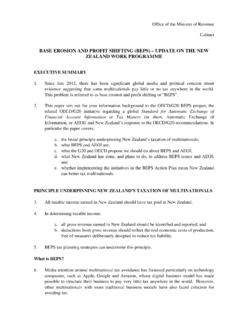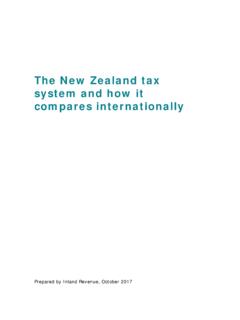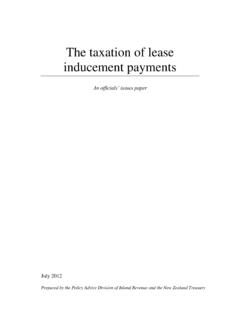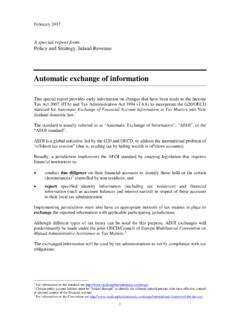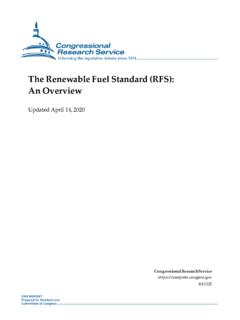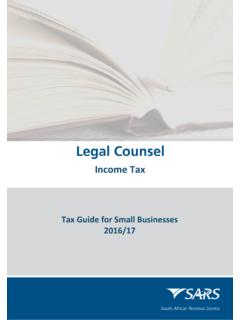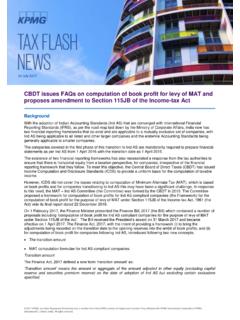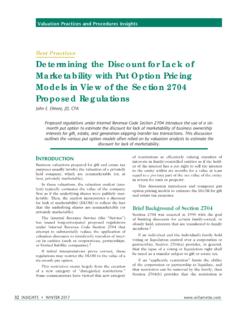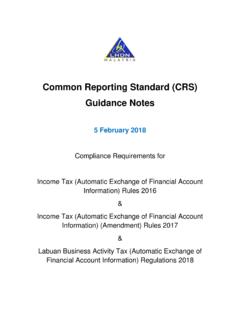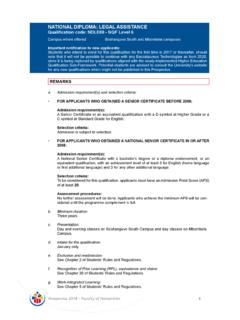Transcription of Taxation (Neutralising Base Erosion and Profit …
1 Taxation ( neutralising base Erosion and Profit Shifting) Bill Commentary on the Bill Hon Stuart Nash Minister of Revenue First published in December 2017 by Policy and Strategy, Inland Revenue, PO Box 2198, Wellington 6140. Taxation ( neutralising base Erosion and Profit Shifting) Bill - Commentary on the Bill. ISBN 978-0-478-42439-3. CONTENTS. Overview of the Bill 1. Bill overview 3. Interest limitation rules 5. Overview 7. Restricted transfer pricing 9. Thin capitalisation 25. Infrastructure project finance 31.
2 Permanent establishment rules 35. Permanent establishment rules 37. Transfer pricing payments rules 49. Transfer pricing rules 51. Country by Country reports 58. Hybrid and branch mismatch rules 61. Overview 63. Hybrid financial instrument rule 64. Disregarded hybrid payments and deemed branch payments 70. Reverse hybrid rule and branch payee mismatch rule 75. Deductible hybrid and branch payments rule 78. Dual resident payer rule 82. Imported mismatch rule 83. Surplus assessable income 85. Dividend election 89.
3 Opaque election 91. Hybrid rule definitions 93. FIF rule changes relating to hybrid rules 96. NRWT changes consequent on hybrid rules 99. Thin capitalisation changes consequent upon hybrid rules 100. NRWT on hybrid arrangements: treaty issue 102. Other policy matters 105. Increasing Inland Revenue's ability to obtain information from offshore group members 107. Collection of tax from local subsidiary of multinational group member 111. Deemed source rule 113. Life reinsurance 115. Overview of the Bill 1. 2. BILL OVERVIEW.
4 Since late 2012, there has been significant global media and political concern about evidence suggesting that some multinational corporations engage in aggressive tax planning strategies to pay little or no tax anywhere in the world. These strategies are known as base Erosion and Profit shifting or BEPS . The issue of BEPS formed part of the G20 agenda in 2013, who asked the OECD to report back to it with global strategies to address international concerns. The end result was the adoption of a OECD/G20 15-point Action Plan recommending a combination of domestic reforms, tax treaty changes, and administrative measures that would allow countries to strengthen their laws in a consistent manner and work together in combatting BEPS.
5 Recognising our own vulnerability to BEPS and the value of working cooperatively, New Zealand actively participated in the OECD/G20 project, which was finalised at the end of 2015. In June 2016, in response to the OECD's BEPS work, the New Zealand Government released its own BEPS programme to address BEPS issues in New Zealand. New Zealand's response to BEPS is generally aligned with Australia's. It is also broadly consistent with the OECD/G20 Action Plan, although the specific proposals are tailored for the New Zealand environment.
6 In some instances, New Zealand's existing tax laws are already consistent with OECD recommendations. In other cases, however, tax treaty and domestic law changes are required to address BEPS. The measures proposed in this Bill will prevent multinationals from using: artificially high interest rates on loans from related parties to shift profits out of New Zealand (interest limitation rules);. hybrid mismatch arrangements that exploit differences between countries' tax rules to achieve an advantageous tax position.
7 Artificial arrangements to avoid having a taxable presence (a permanent establishment) in New Zealand; and related-party transactions (transfer pricing) to shift profits into offshore group members in a manner that does not reflect the actual economic activities undertaken in New Zealand and offshore. The Bill makes amendments to the Income Tax Act 2007 and the Tax Administration Act 1994. Each provision of the Bill comes into force on the date specified in the Bill for that provision. For most provisions this is income years beginning on or after 1 July 2018.
8 3. 4. Interest limitation rules 5. 6. OVERVIEW. The use of debt is one of the simplest ways of shifting profits out of New Zealand. Robust rules limiting the use of debt (and limiting interest payments on that debt) are therefore important base protection measures. In March this year the Government released the discussion document BEPS . strengthening our interest limitation rules proposing two key changes to these rules: a new method for limiting the deductible interest rate on related-party loans from a non-resident to a New Zealand borrower (referred to as the interest rate cap); and a change to how allowable debt levels are calculated under the thin capitalisation rules (referred to as an adjustment for non-debt liabilities).
9 While submitters acknowledged the need to respond to BEPS concerns, many submitters did not support the specific proposals put forward. The government has refined the proposals to address submitters concerns including better targeting the proposals at borrowers at a high risk of BEPS. The methodology proposed in this Bill is a better way of achieving the interest rate cap's objective. Like the cap, this approach will generally result in the interest rate on the related-party debt being in line with that facing the foreign parent.
10 This is because, under the rule, debt will generally be required to be priced on the basis that it is vanilla (that is, without any features or terms that could push up the interest rate). and on the basis that the borrower could be expected to be supported by its foreign parent in the event of a default. Implementing these restrictions in legislation will address the problem that the transfer pricing guidelines, in so far as they apply to related-party debt, are open to interpretation, subjective, and fact intensive in their application.
